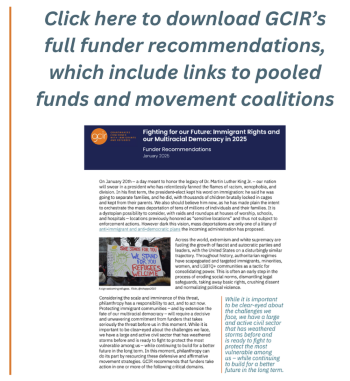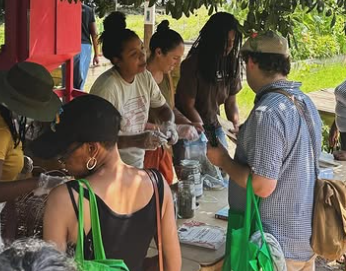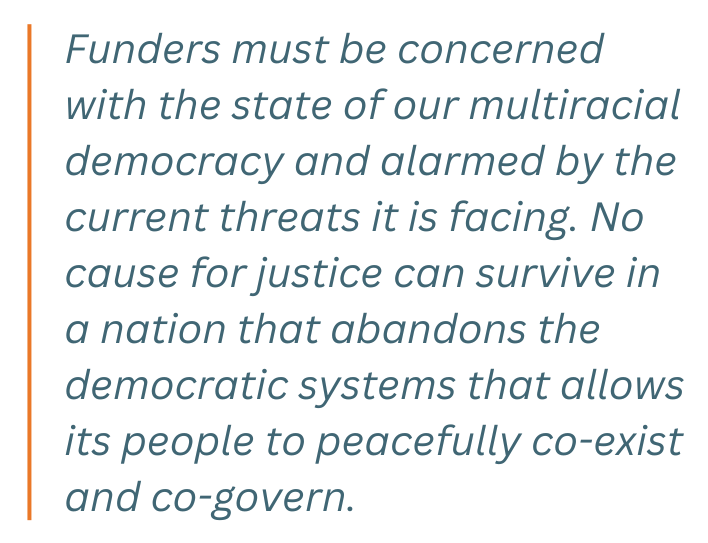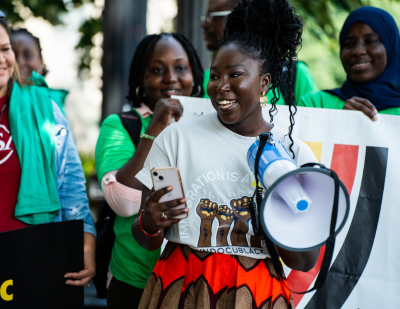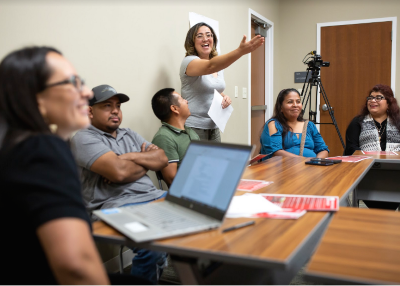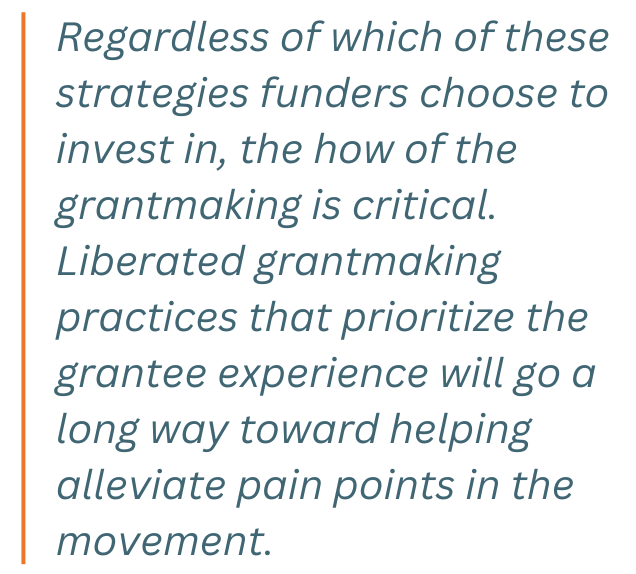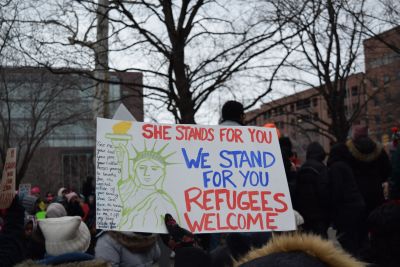
Across the world, extremism and white supremacy are fueling the growth of fascist and autocratic parties and leaders, with the United States on a disturbingly similar trajectory. Throughout history, authoritarian regimes have scapegoated and targeted immigrants, minorities, women, and LGBTQ+ communities as a tactic for consolidating power. This is often an early step in the process of eroding social norms, dismantling legal safeguards, taking away basic rights, crushing dissent, and normalizing political violence.
Considering the scale and imminence of this threat, philanthropy has a responsibility to act, and to act now. Protecting immigrant communities – and by extension the fate of our multiracial democracy – will require a decisive and unwavering commitment from funders that takes seriously the threat before us in this moment. While it is important to be clear-eyed about the challenges we face, we have a large and active civil sector that has weathered storms before and is ready to fight to protect the most vulnerable among us – while continuing to build for a better future in the long term. In this moment, philanthropy can do its part by resourcing these defensive and affirmative movement strategies. GCIR recommends that funders take action in one or more of the following critical domains.
immediate interventions
Safety, Security, and Well-being
Xenophobia, white supremacy, and other extremist social and political ideologies are an ongoing threat to the safety and security of both targeted community members and the organizations serving and advocating alongside them. From physical threats in public spaces, people’s homes, and their workplaces (vandalization, bomb threats, swatting, assault, etc.), to digital threats (harassing, doxing, DDoS attacks, hacking, etc.), movement practitioners need support in identifying potential threats and adopting preventive practices.
The trauma and fatigue that comes from living and working under these conditions—compounded by a broader hostile political and social landscape—frequently leads to burnout and emotional strain on grantees and communities. Providing grants that allow organizations to address the health and well-being of their staff, in addition to securing their personal safety, is critical to ensuring that the movement remains resilient.
Rapid Response and Mutual Aid
Nonprofits and self-organizing community groups have already experienced a spike in demand from fearful community members. Scaling up Know-Your-Rights (KYR) trainings, mental health support, and organizational capacity to meet growing demand from community members will be a key need in the coming years.For instance, many families need support preparing for and responding to forced separations, including developing care plans for children, securing essential documentation, and creating plans for communication in the event of separation. Grassroots mutual aid responses led by trusted leaders will be critical for community members alongside more traditional, 501(c)3 nonprofit structures.
Legal Representation and Litigation
While the law has increasingly been weaponized against immigrants at the local, state, and national levels, it remains one of the most powerful tools immigrant rights defenders have to protect their clients and advance systemic reform. Service providers have identified an urgent need to scale up legal services – including screening, referral, and representation networks – in response to anticipated increases in raids, detentions, and deportation orders nationwide. This demand comes at a time when the legal services sector is already overburdened, with significant geographic gaps and a shortage of culturally competent legal practitioners.
During the first Trump presidency, litigators successfully used the courts to delay or block many of the administration’s most egregious policies. However, the judiciary is now widely viewed as less willing to check the president’s excesses given the significant number of judicial appointments made during his last term, as well as SCOTUS’s recent decisions on issues ranging from women’s reproductive rights to presidential immunity around the January 6th insurrection. In response, litigation organizations need the resources to strategically coordinate the cases they bring, including the selection of plaintiffs and jurisdictions.
long-term strategies
Organizing, Advocacy, and Power Building
A foundational tenet of social change work is that it will never be easy or linear; progress requires the cultivation and strategic exercise of power over time. Organizers and advocates understand that the work to build this power transcends electoral cycles. They are already developing campaigns and strategies to preserve rights wherever possible, while also pursuing new opportunities at state and local levels of government.Advocates have a long list of policy priorities with real promise for advancement at the state and local levels, including municipal identification cards and state drivers’ licenses, expanded eligibility for health and social benefit programs, and tuition equity and inclusive occupational licensing standards.
Beyond immigrant-specific concerns, immigrant organizing groups are forging ties with housing justice, racial justice, and other movements for justice in recognition of the intersectional nature of the challenges facing their communities and the power of collective struggle. Centering impacted leadership, including that of BIPOC and API immigrants and refugees, as well as those with intersectional identities such as LGBTQIA+ individuals, those living with disabilities, and those who were formerly incarcerated, is essential for ensuring that movement strategies are community informed.
Protecting and Bolstering the Nonprofit Sector
The "Nonprofit Killer” bill making its way through Congress seeks to silence nonprofit organizations by threatening revocation of their tax-exempt status. Philanthropy must not only speak out against this anti-democratic proposal, but also support its grantees’ ability to navigate hostile legal terrain while continuing to carry out their core functions. A similar attack on nonprofits serving immigrants without documentation was launched in late 2024 via the "BARRIER” and “HARRIS” Acts, which would deny groups federal funds as well as their tax-exempt status, for “aiding and abetting the U.S. border invasion.”
As seen with the chilling effect on diversity, equity, and inclusion initiatives following the Fearless Fund settlement, movement leaders fear that these new types of legislation will be wielded not only to censor advocacy against the genocide in Palestine but also to broadly suppress free speech. This bill could serve as a dangerous precedent for further attacks on nonprofits addressing issues such as LGBTQ+ rights, immigrant rights, union organizing, and anti-war activism.
As movement leaders retire or burn out, and organizations are stretched thin by the demands of carrying out their core work while responding to crises, the sector needs help shoring up its infrastructure. Investments in leadership pipelines, physical infrastructure improvements, and technology acquisition and training will bolster the movement’s ability to nimbly serve their communities now, while continuing to advance their longer-term visions.
Narrative, Media, and Communications
In recent years, there has been a growing consensus within the immigrant rights movement that the narrative battle on the role of immigrants in American society has been lost. During the first Trump administration, with its relentless barrage of xenophobic policies, popular sentiment shifted in support of immigrants and refugees. But by the time the Biden administration’s term concluded, public support for immigrants had significantly eroded.
Rather than simply fighting back against false narratives, movement leaders are working to imagine new and alternative positive narratives and strategizing on how to seed and advance them with the public. They are crafting narratives around a vision of the society they want to build, not just fighting against what they oppose. Grounded in research and informed by message testing, narrative practitioners are helping craft a new story of immigrants across social and popular media platforms.
At the same time, independent nonprofit media outlets are also seeking to fill a gap in the media landscape, ensuring that immigrant communities have access to trusted and culturally competent sources of information on the issues that matter to them. Investing in narrative, media, and strategic communications infrastructure is a necessary step toward creating the conditions for a more united and immigrant-friendly national consciousness.
Pro-Democracy Work
If philanthropy’s purpose is to contribute to the common good, funders must be concerned with the state of our multiracial democracy and alarmed by the current threats it is facing. No cause for justice can survive in a nation that abandons the democratic systems that allows its people to peacefully co-exist and co-govern. Unfortunately, many of the most sacred tenets of our democracy – including the right to vote unencumbered, birthright citizenship, proportional representation, and respect for human rights – are in peril. Even the basic norms and practices that have enabled us to function as a civil society are under threat, as online echo chambers foment division, hatred, and violence. It is necessary then, to support those organizations working to keep our democracy free, fair, and accessible to all.
Solidarity Strategies
Just as Audre Lorde observed that “there is no such thing as a single-issue struggle, because we do not live single-issue lives,” funders must adopt flexible grantmaking strategies that not only support those working at the intersection of immigrant rights and democracy preservation, but also those movement groups working at the intersections of racial, gender, worker, disability, housing, climate, and all forms of justice.
recommendations for philanthropic action
Regardless of which of these strategies funders choose to invest in, the how of the grantmaking is critical. Liberated grantmaking practices that prioritize the grantee experience will go a long way toward helping alleviate pain points in the movement. As a principle, funders should seek wherever possible to:
- provide flexible, long-term, general operating support grants (2+ years).
- reduce barriers to entry and minimize reporting burdens.
- grant out more than the five percent minimum and ensure investment strategies align with grantmaking goals.
- ensure balance between support for national organizations and state/local efforts, with intentional inclusion of smaller, impacted-led groups.
- build authentic, supportive relationships with grantees.
- leverage the foundation’s voice and influence through communications and advocacy in support of immigrant and refugee justice.
- fund collaboratively with colleague institutions through aligned or pooled grantmaking approaches.
The time for philanthropy to act is now. The challenges before us are significant and urgent, but a talented and courageous movement is ready to meet them head on. By boldly deploying its resources and leveraging its social capital, philanthropy can play a meaningful role in protecting immigrant rights and defending our democracy.
click here to download gcir's full funder recommendations, which include links to pooled funds and movement coalitions
Photo credits, top to bottom: @rchappo2002 on Flickr; DC Mutual Aid Apothecary on Instagram; fourfreedomsfund.org; and borealisphilanthropy.org.
